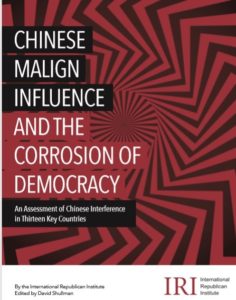 With its economic success, China seems to convey to the world that democracy is not a prerequisite for prosperity and social well-being, says analyst Emily S. Chen. At least for now, China may not intend to challenge the global state of democracy by actively blocking the expansion of democracy or promoting authoritarianism. However, Beijing’s growing global influence, along with its overseas activities in defending the Chinese Communist Party regime and seeking greater international status, have had a negative impact on liberal democracy.
With its economic success, China seems to convey to the world that democracy is not a prerequisite for prosperity and social well-being, says analyst Emily S. Chen. At least for now, China may not intend to challenge the global state of democracy by actively blocking the expansion of democracy or promoting authoritarianism. However, Beijing’s growing global influence, along with its overseas activities in defending the Chinese Communist Party regime and seeking greater international status, have had a negative impact on liberal democracy.
How China’s overseas activities harm global democracy differs according to the regime types of targeted countries, she writes in a paper for the Pacific Forum:
To existing democracies, China’s alleged political interference activities have the potential to curtail the integrity of the country’s democratic system and threatens its sovereignty. …To countries still building their own political system and development path, China’s emphasis on pursuing a policy of neutrality toward other countries’ regime types under the leadership of former Chinese Premier Wen Jiabao compromises Western countries’ efforts in overseas democracy promotion…. In fact, China need not bother actively promoting authoritarianism. By the power of its own example, China has shown that democracy is not a precondition for prosperity and social wellbeing.
 The Chinese government defines itself as a foe of Western liberal democracy and the upholder of its own brand of communist nationalism, notes Nikki Haley, U.S. Representative to the United Nations from 2017 through 2018. Its strategic ambitions are unfriendly, far-reaching, and deeply rooted in an authoritarian worldview, she writes for Foreign Affairs:
The Chinese government defines itself as a foe of Western liberal democracy and the upholder of its own brand of communist nationalism, notes Nikki Haley, U.S. Representative to the United Nations from 2017 through 2018. Its strategic ambitions are unfriendly, far-reaching, and deeply rooted in an authoritarian worldview, she writes for Foreign Affairs:
China poses intellectual, technological, political, diplomatic, and military challenges to the United States. The necessary response is similarly multifaceted, requiring action in fields as disparate as intelligence, law enforcement, private business, and higher education. In recent years, many problems have been described as requiring “whole of government” responses. China requires a response that is not just “whole of government” but “whole of nation.” Fortunately, there is support across the political spectrum for countering China’s new aggressive policies. RTWT
China’s sharp power is having a demonstrable corrosive impact on vulnerable democracies, according to Chinese Malign Influence and the Corrosion of Democracy (above), a recent report from the International Republican Institute’s (IRI) Building Resiliency for Interconnected Democracies in Global Environments (BRIDGE) initiative, funded by the National Endowment for Democracy,







